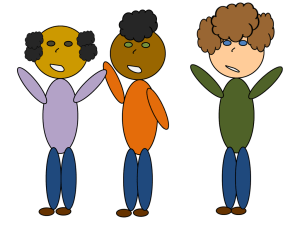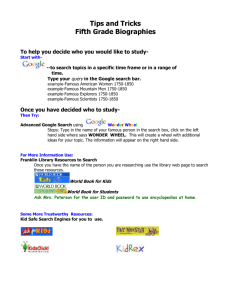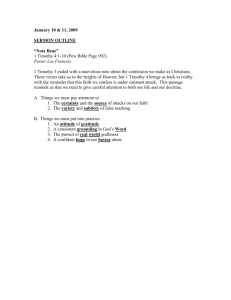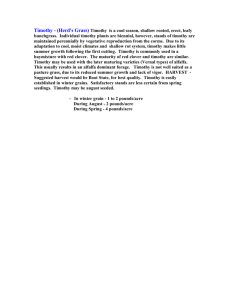Sleepless Driving - Stacks are the Stanford
advertisement
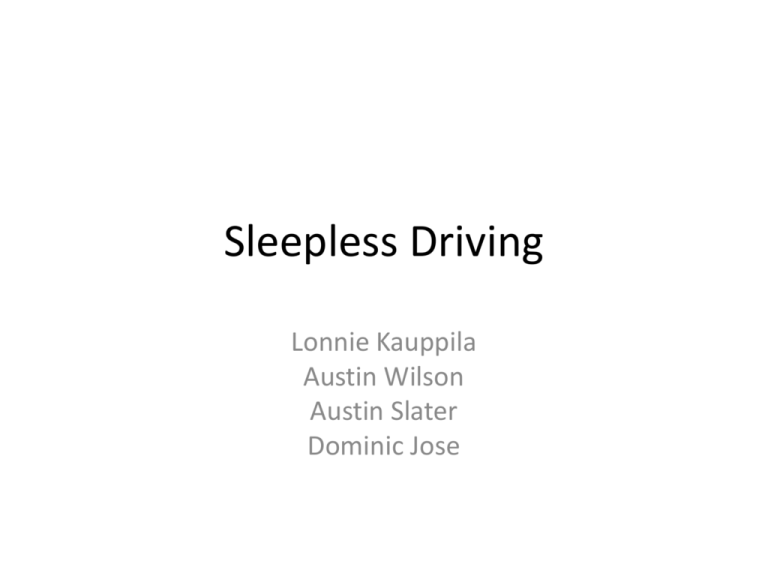
Sleepless Driving Lonnie Kauppila Austin Wilson Austin Slater Dominic Jose Useful For All Commuters Sleepless Driving is perfect for almost any driver whose daily routine involves any sort of commuting. Whether it be long, tedious road trips or daily, dreary commutes to and from work, this system helps drivers stay attentive while on the road. Drivers often battle the urge to fall asleep while driving for several reasons – ranging from a late night of having a few legal beverages or incurring a long drive after working overtime. This unnoticeable addition to your steering wheel will contest the urge to fall asleep by recognizing when the body is beginning to feel sleepy by monitoring heart rate, brain activity and eyesight to recognize and counter drowsiness with loud music and harmless jerks (as if the car were to stop) to help keep drivers awake and safe. Steering Wheel Sensors Sensor Sensor Camera Sensor Sensors placed all over the back of the steering wheel, including ones at 10, 2, and 6 (as shown) would be similar to those that are used on treadmills or exercise bikes. Like those that have the ability to determine heart rate, calories burned, etc., these will have the ability to determine heart rate, stress, brain waves, and the activity in the cortex (the surface of the brain). Research states that the activity in the brain drops 40% in the initial phases of sleeping, becoming a crucial factor of the overall design. The almost invisible camera located on the steering wheel focuses solely on the eyes and eyelids, where eyes begin closing (obviously) and rolling during the initial stages of sleep. Sleepless Driving The sensors and camera are all reflected within the car’s navigation system. All the information – heart rate, brain activity, etc. – are available within the navigational options, allowing yourself to see exactly how your body is reacting when you are driving, especially when dozing off. Alerts flash on the screen to begin notifying the driver of both slowing heart rate and decreased brain activity, important signals that assist the driver become self aware of his current state. Meet Timothy • Timothy is a 29 year old upcoming attorney who has been working all quarter long on his first solo court case. If he wins the case he will receive a bonus at his law firm that is two times his initial salary. He has been saving up for him and his new fiancé to ultimately purchase a new house so they can move out of their apartment. He has worked extra hours on a weekly basis to make sure his will ultimately be flawless. Scenario • Timothy is working late one Friday night and and is going to arrive home way past midnight. Everyday to work, he has a long commute because the real estate close to his office is not within the realm of his budget. Keep in mind that Timothy has been getting home at around 1am and even 2am some nights! On top of that he also gets up at 6:00 am to be first person in the office. Scenario • It is almost the weekend, and Timothy is exhausted and leaves the office. He gets into his car and begins his drive home. He has the heater on because it is dark, cold and raining outside. He is very drowsy because his mind and body have been vigorously devoted to this case. ZzzzZZzz • About 20 minutes into his drive, Timothy is cruising on the freeway when he begins to doze off. His hands on the steering wheel sensors read his brain activity starting to wane, his heart rate begins to slow down. He is trying to stay awake but his eyes keep opening and closing…opening and closing….and opening and closing…Finally his eyes close for 1 second….2 seconds ….3 seconds… SAFETY! • 4 seconds….5 seconds…..then BAMF! Music erupts. The car brakes and jolts because the safety system is triggered. The interface was able to detect its user was in danger and it displayed its affordance to ultimately ensure the user would not harm itself. • Timothy wakes up and realizes the music that is blaring and that is car has ultimately come to a stop. Although he is still tired, the sensors are able to read that his heart rate is up and his brain activity is also initialized therefore preventing an accident and creating a safe ride home. WAKE UP!! Finally Home • Timothy is able to make it alive and well! He wakes up his wife to tell the story about his near death experience behind the wheel. Timothy is thankful for Sleepless Driving because it was able to detect his mistake of not staying awake behind the wheel. He later went on to win his first solo case as an attorney and was finally able to find a new place and move closer to his office. People sometimes forget that automobiles are not just toys but in fact machines, and if they are not used with full attention, lives can be put at risk. Sleepless Driving is a product that reminds people to stay awake and pay attention while using an automobile.

